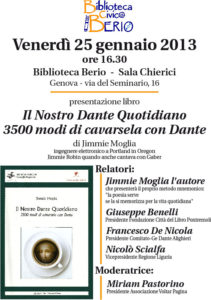 This website webmaster will be absent for a few days in Italy, where he will give presentations on his book “Il Nostro Dante Quotidiano – 3500 modi di cavarsela con Dante”. Translation, “Our Daily Dante – 3500 ways to get away with it with Dante”. The book was published by the Tuscan Region and the presentations will be in Genoa, Turin and Milan.
This website webmaster will be absent for a few days in Italy, where he will give presentations on his book “Il Nostro Dante Quotidiano – 3500 modi di cavarsela con Dante”. Translation, “Our Daily Dante – 3500 ways to get away with it with Dante”. The book was published by the Tuscan Region and the presentations will be in Genoa, Turin and Milan.
But could I leave without an appropriate quote?
“…I hope,
My absence doth neglect no great designs,
Which by my presence might have been concluded.”
(King Richard III, act 3, sc. 4)
“Our Daily Dante” is the counterpart of “Your Daily Shakespeare – an Arsenal of Verbal Weapons to Drive your Friends into Action and your Enemies into Despair” By the way, you can get the Shakespeare book via Amazon or via the webmaster by contacting him through this website.
And this is NOT an advertisement, “To things of sale a seller’s praise belongs” (Love’s Labours Lost, act 4, sc. 3). Just that the book has proven very useful to scores of user/readers/students for the reasons explained in the Video Presentation (see menu) or in The Book (see menu). “Your Daily Shakespeare” weight 3.5 lb – International Inquirers, I will give you a quote.
 Shakespeare and Dante are the Contemporaries of the future – this is why I wrote a similar book on both of them. They will never stale. And in an environment where mankind does not seem any any more where it is going, the classics are a sure anchor for our perplexed, not to say bewildered minds.
Shakespeare and Dante are the Contemporaries of the future – this is why I wrote a similar book on both of them. They will never stale. And in an environment where mankind does not seem any any more where it is going, the classics are a sure anchor for our perplexed, not to say bewildered minds.
As you may know, Italy features largely in Shakespeare’s plays.
The following plays take place in Italy entirely,
Merchant of Venice.
Two Gentlemen of Verona
Julius Caesar
And the following plays are set, at least in part, in Italy:
All’s Well that Ends Well
Anthony and Cleopatra
Coriolanus
Cymbeline
Romeo & Juliet
Taming of the Shrew
The Tempest
Othello
Curiously, Shakespeare makes references to various real life Italian characters, but Dante is left out. Never mind, both can stand alone and will ever stand on their own.
See you soon and “May all the number of the stars give light to your fair way(s)” (Antony and Cleopatra, act 3, sc. 2)
